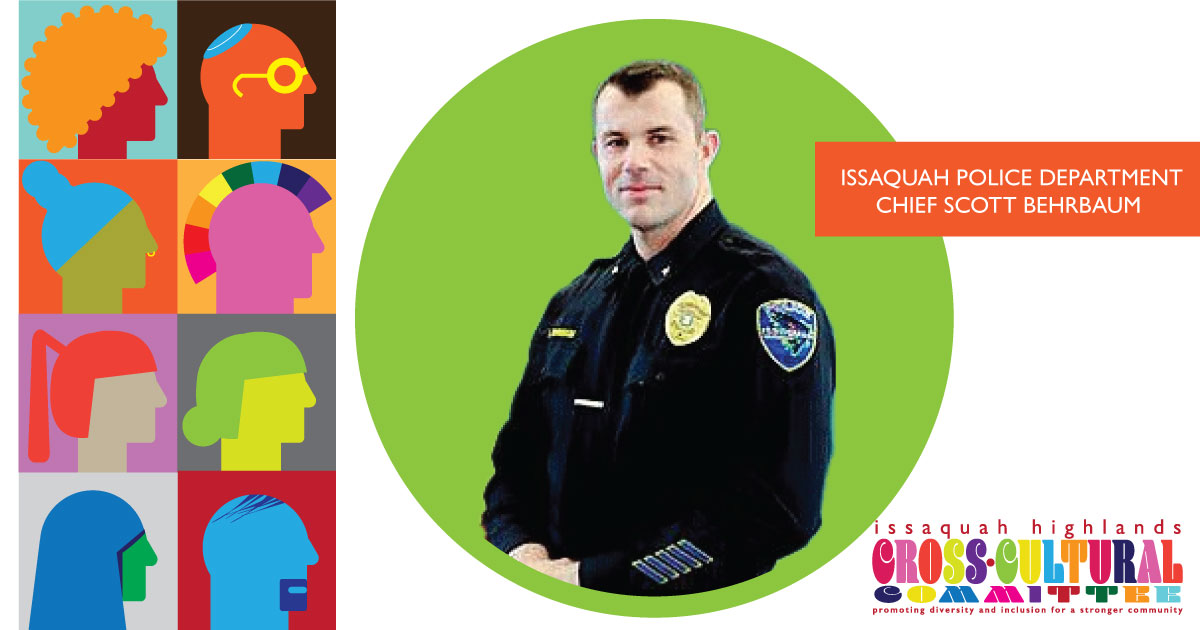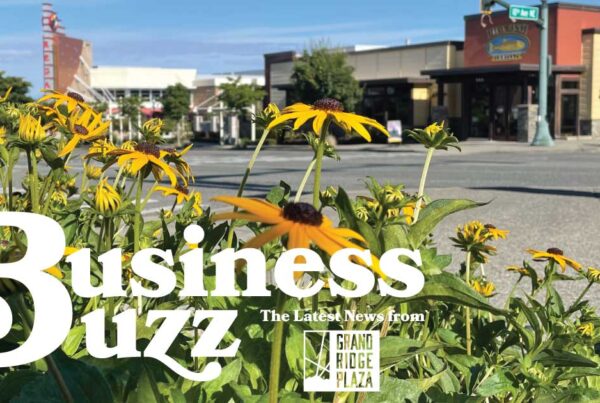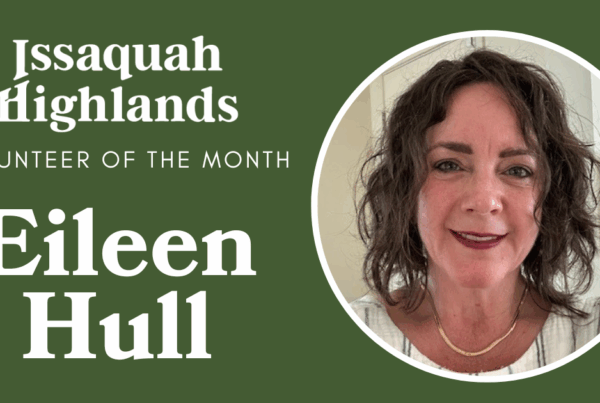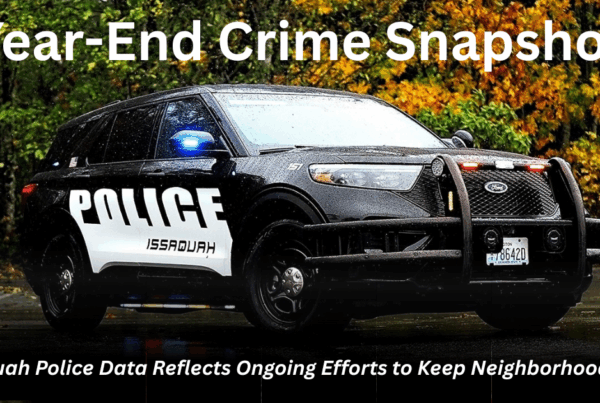
Issaquah Police Department (IPD) Chief Scott Behrbaum joined the Issaquah Highlands Cross-Cultural Committee for an hour-long virtual community meeting on May 6. Kimberly Kapustein, Highlands Council Board of Trustees President and Cross-Cultural Committee leader moderated the discussion, covering a range of topics submitted by the community. Below is an overview of some of the topics discussed.
IPD is a “Community-Oriented Police Department”
Chief Behrbaum explained community-oriented policing means interacting with community members and really getting to know each other.
“We work in partnerships with neighborhoods and spend a few extra moments with the people we interact with,” Chief Behrbaum said. “You’re all that matters when we are there with you.”
Working on Cultural Competency
Chief Behrbaum explained how IPD works on “cultural competency,” trying to understand the different community members with whom they come into contact. Over the last few months, a focus has been on microaggressions and inclusivity in the workplace.
Watch the clip below to hear Chief Behrbaum reflect on how much IPD has learned and continues to grow with each community interaction.
Supporting Our Asian American and Pacific Islander (AAPI) Neighbors
Chief Behrbaum encourages community members to call IPD if they are experiencing or witnessing a hate crime. IPD believes hate crimes against our AAPI community have been underreported. Chief Behrbaum also encourages all community members to attend bystander and allyship training to learn what to do to best support our neighbors if you encounter hate in progress.
Welcoming a City Behavioral Health Coordinator
The city of Issaquah recently hired a behavioral health coordinator, Amir Shabaneh to work with IPD to help people in crisis and connect them with services.
“It is part of the overall strategy of the city to look at how we provide services to community members,” Chief Behrbaum said. “At this time, every call goes through the police, but not every call necessarily requires a police presence. We’d like to respond with services that the community is comfortable with and coordinate outreach for people who are experiencing homelessness or mental health issues.”
Further updates about how the behavioral health coordinator position interconnects with IPD will be part of the Police Accountability and Action Plan discussion during the City Council Study Session on May 25.
Understanding Increased Motor Vehicle-Related Thefts
Year-to-date, motor vehicle theft in Issaquah Highlands is up 150% (from two in 2020 to five this year), thefts from vehicles is up 185% (from 13 in 2020 to 37 this year), and general thefts are up 80% (from 46 in 2020 to 83 this year). Similar increases are being seen throughout Issaquah and King County.
Why is there an uptick in these crimes?
“Unfortunately, because of COVID, a lot of jails have had to reduce capacity and agencies are only booking individuals for mandatory arrests. As a result, we have seen an increase in crimes waiting to go to court,” Chief Behrbaum said. “These individuals aren’t getting referred to treatment or services because of the impact of the pandemic on the availability of resources; there’s a backlog across the country of people trying to access these services.”
According to Chief Behrbaum, motor vehicle theft is a crime of opportunity, so the best thing we can do to deter thieves is to avoid leaving items in our cars.
Visit the IPD Community Dashboard to view crime rates in Issaquah by neighborhood for the past two years.
Addressing Homelessness in Issaquah Highlands
Chief Behrbaum explained it is difficult to provide a single answer to what can be done for people experiencing homelessness because each individual has their own story. The city of Issaquah is working to determine how to best approach people experiencing homelessness, and how to support them with outreach. IPD currently partners with the Issaquah Food & Clothing Bank and will now work with the new city behavioral health coordinator. The city is also hiring a park ranger to help with open spaces.
“Our first step is that of outreach and to help people get connected to services, then provide wraparound or follow-up services because a one-time outreach won’t solve the problem,” Chief Behrhaum said.
If you see someone in need of help or support, please call the IPD non-emergency line at 425-837-3200.
Improving IPD’s Relationship with Citizens
Given recent events nationwide, many people have a negative perception of police. Watch the clip below to hear Chief Behrbaum explain how IPD is working to increase public trust.
How the Community Can Support IPD
When asked how residents can best support IPD, Chief Behrbaum talked about the importance of involving IPD and its officers in community meetings and important conversations.
“When you do see us, engage our officers in conversation – they enjoy meeting community members. Small moments of interactions go a long way,” Chief Behrbaum said.
He invites residents to apply as community representatives to the Police Department Independent Investigation Team. If there is a lethal use of force, these community representatives act as auditors, or as a community lens on those investigations.
“If you see something, say something,” Chief Behrbaum said. “Please report a crime if you see one take place.”
Resources and How to Contact IPD
If you feel threatened or are witnessing a crime in progress, please call 911. If you can’t call, you can also Text-to-9-1-1.
If it is not an emergency, please call IPD’s non-emergency number at 425-837-3200 or use the online form to report a concern.
More resources are available on the Issaquah Police Department’s website.
Chelsea Musick is a member of the Issaquah Highlands Cross-Cultural Committee and is a Wisteria Park resident.





